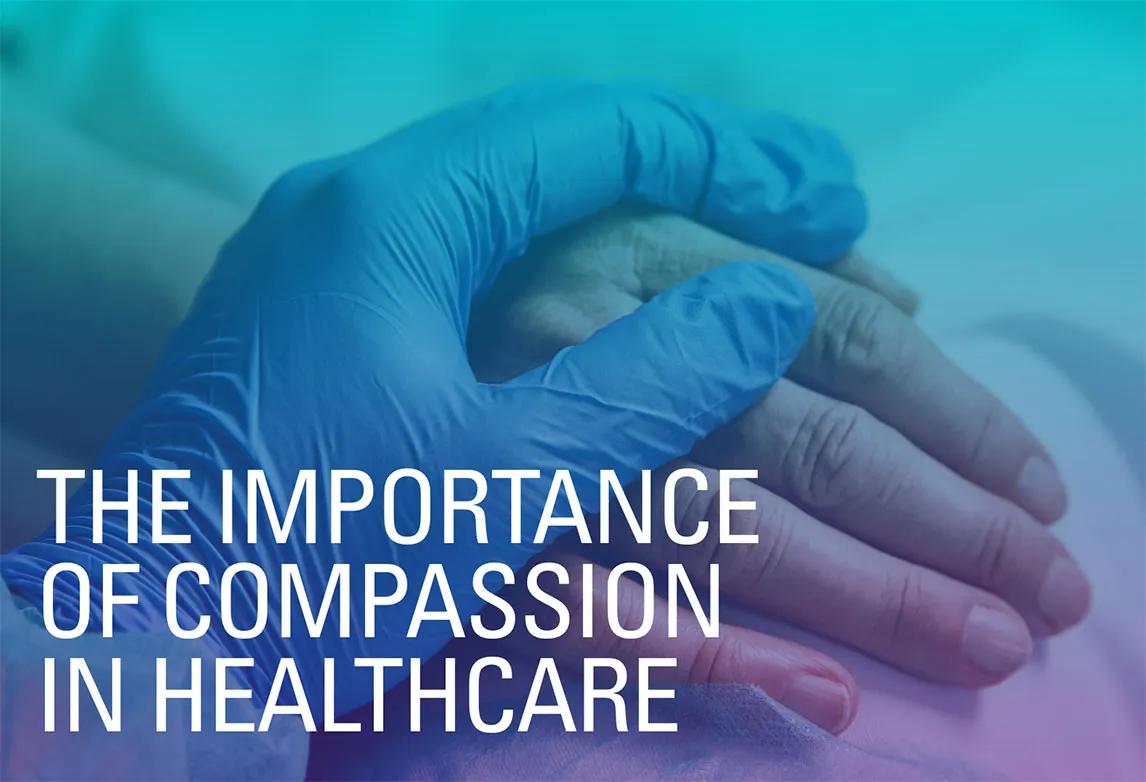The Importance of Compassion in Healthcare

Compassion is defined as the sympathetic consciousness of others’ distress together with a desire to alleviate. Healthcare is the effort made to maintain or restore physical, mental, or emotional well-being, especially by trained and licensed professionals.
It’s important for patient care organizations to have the former in order to provide the latter. But equally important is an understanding of why this matters and what goes into it.
Whether you have an interest in healthcare, are a student hoping to provide patient care in the future, or are a working professional, compassion is an ever-expanding topic that merits continued learning. At the end of day, we are all patients at some point. Knowing how to spot good examples of compassion in healthcare can be useful as we navigate our own career paths.
What Does Compassion Look Like in Healthcare?
There are concrete examples as to what compassion looks like in practice. Below are three to keep in mind as a provider and something to look for as a patient.
-
Being an active listener
As a student, you can be an excellent notetaker. But are you actually listening? Are you retaining the information being taught? People want to feel heard. Understanding how you tend to communicate and listen can make difference in many facets of your everyday life. As a healthcare provider, having that level of self-awareness can go a long way in developing this skill which can help you create good and lasting impressions with patients. Paying attention, showing that you’re listening, providing feedback, deferring judgement, and responding appropriately are key steps to becoming a more active listener.
-
Providing emotional support
In healthcare, the desire to “fix” a patient’s problem may come naturally. While important, fixing isn’t always the first answer. Think about times when you were struggling with a personal dilemma. Did you always want a solution the problem, or rather support in how that problem was making you feel? Being there for a patient emotionally and showing your compassion can foster a positive relationship between the patient and organization as a whole, which is what you represent when working at a facility. In addition, practicing this in your personal life with family and friends can be a good way for this to develop this skill. With time, this can become a more natural response that can be incorporated it into the role of a healthcare provider.
-
Answering patient questions
Ultimately, patients turn to healthcare providers for solutions. Though active listening and emotional support serve their own key functions, being able to answer a patient’s question — if it is your place to do so — is crucial. If you are providing direct care to a patient, whether that be scheduling, billing, or something more hands-on, you are cultivating a customer experience. But when it comes to healthcare, there are certain topics such as medications, treatments, etc. that you may not always have the answer or may not be at liberty to answer for a patient. Being transparent about this and directing them to someone who can provide answers is just as valuable.
Additional Learning Resources
Active Listening: Hear What People Are Really Saying
How to Be Emotionally Supportive
The Secret Ingredient: Empathy
Across the board, the different methods of displaying your compassion have one thing in common — empathy.
Often confused with sympathy, empathy is experiencing and relating to someone else’s feelings. This differs from sympathy, which is understanding someone else’s suffering — sympathy is cognitive in nature and keeps a certain distance.
Though it may seem simple enough to relate to others, in a healthcare role you’d likely encounter a lot of patients or customers suffering from a variety of ailments. Over time, working in this industry can cause a level of “emotional exhaustion.” When you see enough human suffering, you may become desensitized to it to some degree. This can cause one to become more selective in who they empathize with — a major obstacle to overcome.
For example, a provider may find themselves unable to put themselves in the shoes of those with “self-inflicted” issues, such as habits that increase the likelihood of disease —
smoking, an unhealthy diet, etc. If the provider hasn’t experienced these things in their own life and are managing a number of other patients whom they relate more to, then they may disregard these other groups of people.
So, what happens when empathy doesn’t come naturally?
We must remember the key element of compassion: “…a desire to alleviate.” The moment a provider allows that desire to be influenced negatively by personal experience is the very moment that the patient experience becomes imbalanced. To correct this, it helps to acknowledge your own personal bias, reevaluate, and relate.
Pain and suffering are a spectrum. It can look different from patient to patient and may not always be obvious. As the definition of healthcare would suggest, it is on the provider to make a concerted effort in acknowledging all forms of suffering that a patient may be experiencing.
Even when it’s tough to relate, know that compassion and empathy can be developed over time. All you need is the willingness to seek out opportunities to learn and grow.
Check out these helpful articles on how you can improve your level of empathy and compassion:
- Six Habits of Highly Compassionate People
- 10 Easy Ways to Cultivate Compassion
- 5 Proven Ways to Cultivate Your Compassion
- A Guide to Cultivating Compassion in Your Life, With 7 Practices
Ultimate Medical Academy understands the need for quality patient and customer care and the importance of continued improvement in that area. For over 26 years, UMA has offered comprehensive, accredited healthcare education to students who go on to serve in a variety patient care roles.
Though gaining knowledge as a student is where it starts, we recognize that incorporating compassion and empathy in what you do as a healthcare professional goes a long way in cultivating a positive experience for patients.
If you’re interested in a healthcare career path or to learn more about UMA, visit ultimatemedical.edu or call us at 855-718-0986.
Request Information
Talk with us. Start your journey.
Complete this form and we'll call you to explore options at UMA and answer your questions. We'll also email you info on how to get started. We're with you at every step!
Request Information
Talk with us. Start your journey.
Complete this form and we'll call you to explore options at UMA and answer your questions. We'll also email you info on how to get started. We're with you at every step!
About the Author
 Adam Fenster
Adam FensterAdam Fenster is a senior copywriter at Ultimate Medical Academy, with journalism experience from his time as a reporter and editor for multiple online and print publications. Adam has been covering healthcare education since 2019, with an emphasis on topics such as wellness, healthcare employment, and job preparedness. He received his BA in journalism from the University of South Florida.
Related Content

Is Medical Billing and Coding Hard? What You Should Know About This Career Path
Read More
